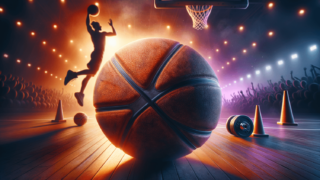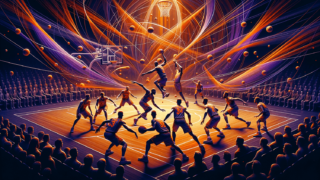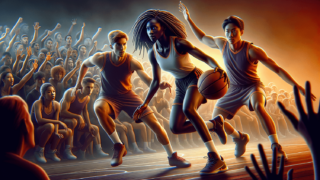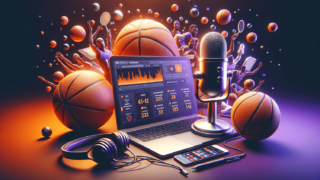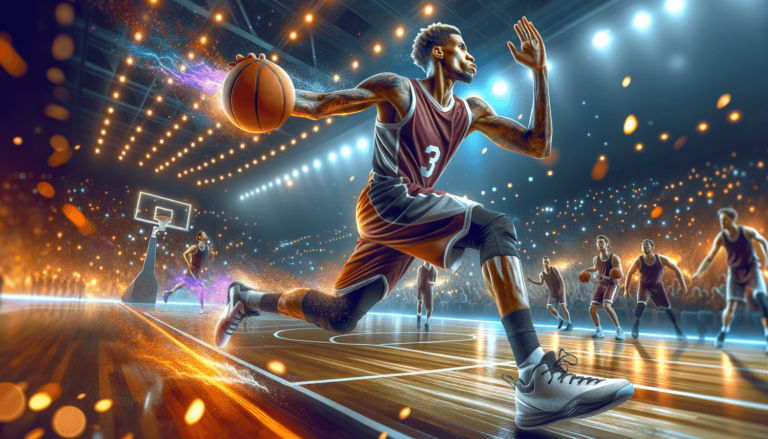
Development of Basketball Skills and Techniques
Written by: Basketball Universe
Last updated:

Welcome to the exciting world of basketball skills and techniques! As a hoops enthusiast looking to dig deep and master all aspects of this exhilarating sport, you’re in for a real treat. In this comprehensive blog post, we’ll journey through the essentials of ball handling, shooting, passing, defense, and more, while unearthing the secrets behind the game’s tricks and tactics. Lace-up your sneakers and get ready, as we’re about to embark on a fun, yet professional exploration of the fundamentals that will elevate your performance and understanding of the game to all new heights!
Development of Basketball Skills and Techniques
The development of basketball skills and techniques involves mastering the core aspects of the game, including ball handling, shooting, passing, defense, and conditioning. Players must approach each element with diligence and persistence, gradually improving through consistent practice, coaching, and game experience. Incorporating drills that focus on specific skill sets, studying game tapes, and learning from experienced players and coaches can significantly accelerate the development process. Additionally, adopting strategies such as setting realistic goals, tracking progress, and maintaining an open mindset for continued learning will lead to ongoing growth and success on the court.
Mastering Ball Handling
Ball handling is a fundamental basketball skill, essential for dribbling, passing, and shooting. Superior ball handling skills open up opportunities on the court, allowing players to create space, make quick moves, and maintain control during high-pressure situations. To develop top-notch ball handling techniques, consider incorporating these tips and exercises into your regular practice routine.
Finger Control and Strength
Improving your finger control and strength is crucial for better ball handling. Some effective exercises include finger taps, fingertip push-ups, and spider dribbling. Practicing drills that engage your fingers and hands will enhance your dexterity, coordination, and overall control over the ball.
Two-Ball Dribbling
Two-ball dribbling drills push you to become more ambidextrous on the court. For example, try dribbling simultaneously using both hands or alternating dribbles at varying heights and speeds. The challenge of managing two balls simultaneously requires increased focus and agility, ultimately improving your ball handling prowess.
Acing the Art of Shooting
A consistent, accurate shot is the mark of a great basketball player. Fine-tuning your shooting technique requires dedication and repetition, but the rewards are well worth the effort. Sharpen your shooting skills with the following tips and practice activities.
Perfect the Form
Start by nailing down the basics of good shooting form. Focus on aligning your shooting arm, elbow, and wrist, maintaining a comfortable stance, and practicing the “BEEF” method: Balance, Eyes, Elbow, and Follow-Through. By concentrating on these aspects and emphasizing good habits, you’ll be well on your way to developing a reliable shot.
Targeted Shooting Drills
Implement targeted shooting drills that focus on various aspects of your shot, such as power, accuracy, and quick release. Begin by shooting from close range, then gradually move outward to improve both consistency and range. Remember, quality over quantity; prioritize proper technique over the number of shots made.
Perfecting the Pass
Great passing can make or break a basketball game. Developing finesse and accuracy in this fundamental skill will help you move the ball with ease, create scoring opportunities, and build chemistry with your teammates. Become a passing virtuoso with these suggestions and drills.
Learn and Practice Different Types of Passes
Become a versatile passer by learning and practicing various types of passes, such as the chest pass, bounce pass, overhead pass, and no-look pass. Fine-tune your decision-making skills to leverage each type of pass in the appropriate game situation, improving your ability to create scoring chances and evade defenders.
Passing Drills
Incorporate dynamic passing drills into your training that challenge your precision, timing, and court vision. Engaging in exercises like give-and-go, 3-man weave, and partner passing will strengthen your ability to read the court, anticipate teammates’ movements, and deliver pinpoint passes under pressure.
Developing Dominant Defense
A formidable defensive presence is a cornerstone of basketball success, making it an essential skill to master. Effective defense relies on a comprehensive understanding of individual and team concepts, quick reaction times, and specialized footwork. These strategies and drills will help develop your defensive prowess.
Defensive Stance and Footwork
Good defensive stance and footwork provide the foundation for exceptional defense. Start by perfecting your defensive stance, keeping feet shoulder-width apart, knees bent, and hands up. Practice effective footwork by engaging in exercises like defensive slides and closeouts, enhancing your ability to contain, contest, and anticipate an opponent’s movements.
Team Defense: Communication and Collaboration
Remember that basketball is a team sport, and effective defense requires a combination of individual skill and collaboration among the entire team. Build your team defense by practicing communication, providing help-side defense, and working together to execute defensive schemes, such as zone and switching-maneuvers.
Bolstering Physical Conditioning
Athleticism and conditioning play significant roles in overall basketball performance, impacting areas such as speed, agility, strength, and endurance. By investing time in your physical development, you’ll be better equipped to withstand the demands of competition, enhancing your effectiveness on the court.
Strength and Power Training
Integrate strength and power training exercises into your regimen, focusing on full-body workouts and targeted training for key basketball muscles. This can include exercises like squats, lunges, box jumps, and plyometric training. Building strength and power can drastically improve your ability to box out, drive to the basket, and leap for rebounds.
Agility and Speed
Boost your agility and speed with specialized drills that challenge your acceleration, deceleration, and lateral quickness. Incorporate exercises like sprint and backpedal, cone drills, and ladder drills to hone your ability to alter directions, explode out of cuts, and smoothly transition between offensive and defensive positions.
Cardiovascular Endurance
Develop your cardiovascular endurance with a combination of aerobic and anaerobic exercises, such as running, swimming, interval training, and sports-specific drills. Increased endurance will allow you to maintain peak performance throughout the entire game, giving you a competitive edge when others are running out of gas.
Studying Basketball History and Strategy
Exploring basketball history and reviewing game strategies enriches your understanding of the sport and can inspire new skills and techniques. Analyzing classic games, legendary players, and innovative plays provides valuable insights into the evolution of the game, allowing you to cultivate a well-rounded approach to your development.
Watching Game Film
Studying game film offers the opportunity to observe and analyze the nuances of player movement, court positioning, and tactical execution. By dissecting game tape, you can not only pinpoint areas for personal improvement but also identify tendencies in opponents and glean inspiration from the successes and failures of others.
Reading and Research
Expand your knowledge of basketball history and strategy by reading books, articles, and interviews with prominent players and coaches. Learn about different coaching styles, offensive and defensive systems, and game management strategies to deepen your understanding of the game and apply this knowledge to your own development.
Utilizing Resources and Opportunities
Take advantage of available resources and opportunities to accelerate your basketball skill development. Accessing basketball camps, clinics, coaching, and peers will provide invaluable perspectives, opportunities for growth, and motivation to keep pushing your limits.
Basketball Camps and Clinics
Find and attend basketball camps and clinics, where knowledgeable coaches and trainers can help you hone your skills, gain feedback, and learn new techniques. Engaging in these events exposes you to new methods of development, a competitive atmosphere, and a supportive peer network.
Mentorship and Coaching
Seek mentorship and guidance from experienced coaches, trainers, and players who can provide personalized feedback and encouragement. Tap into their wealth of knowledge, ask questions, and learn how they overcame obstacles in their own basketball journeys.
Supportive Basketball Community
Surround yourself with a positive basketball community that shares your passion for growth and improvement. Establish relationships with like-minded players who can provide constructive feedback, offer friendly competition, and exchange tips and techniques to help everyone on the court reach their full potential.
Setting Goals and Tracking Progress
Setting specific, measurable, achievable, relevant, and time-bound (SMART) goals can help you stay focused and motivated on your basketball skill development journey. Regularly assess your progress, identify areas for improvement, and adjust your goals accordingly. Tracking progress is essential for maintaining motivation and recognizing personal achievements.
Creating a Personalized Training Plan
Develop a customized training plan that addresses your specific needs and goals, incorporating a mix of skill exercises, strength and conditioning, and recovery strategies. Include milestones to measure your progress and adjust your plan as you achieve your targets or encounter challenges.
Dealing with Plateaus and Overcoming Obstacles
Understand that setbacks and plateaus are natural parts of skill development. Embrace these challenges as opportunities to learn and grow. Reflect on your progress, reassess your goals, and adjust your practice routine as needed. Stay persistent and committed to pushing through tough periods and refining your skills.
Developing Mental Toughness and Resilience
Mental toughness and resilience are crucial components of basketball success, as they enable you to stay focused, manage stress, and bounce back from setbacks. Cultivate mental strength through mindfulness, visualization, and self-talk to consistently perform at your best on the court.
Mindfulness and Meditation
Practice mindfulness and meditation to improve concentration, reduce stress, and enhance in-game decision-making. Engage in activities like deep breathing exercises, guided meditation, or yoga to learn how to stay grounded and focused in the present moment, creating an optimal mental state for basketball performance.
Visualization Techniques
Use mental imagery and visualization techniques to prepare for games, improve skill execution, and gain confidence. Envision yourself successfully executing specific basketball skills, facing challenging situations, or making key plays, ultimately bolstering your self-belief and mental fortitude.
Positive Self-Talk and Affirmations
Reframe negative thoughts and self-doubt with positive self-talk and affirmations. Create personalized affirmations that align with your goals, values, and strengths, and use them to mentally reinforce your capabilities, resilience, and potential on the court.
Importance of Rest and Recovery
Rest and recovery are essential components of a well-rounded basketball skill development plan, as they allow your body and mind to recuperate, preventing overtraining and reducing injury risk. Implement regular rest days, adequate sleep, and recovery strategies to ensure your long-term success and enjoyment of the game.
Rest Days and Active Recovery
Factor in rest days and active recovery activities, such as yoga, light jogging, or swimming, into your schedule to help your body recover from the demands of basketball. Striking a balance between training and recovery is essential for maintaining peak performance and preventing burnout.
Getting Adequate Sleep
Ensure you get quality sleep each night, as it is integral to your physical and mental recovery. Ample sleep supports muscle repair, cognitive function, and energy restoration, allowing you to consistently bring your best to the court.
Recovery Techniques
Incorporate recovery techniques like foam rolling, stretching, and ice baths to promote muscle relaxation, reduce soreness, and prepare your body for future training sessions. Complement these activities with proper nutrition and hydration to optimize your recovery and overall basketball performance.
Frequently Asked Questions
For your convenience, we’ve compiled a list of frequently asked questions that are semantically related to the development of basketball skills and techniques. These FAQs address common queries and provide succinct, informative answers to help enhance your basketball knowledge and understanding of the game.
1. How long does it take to see significant improvement in basketball skills?
Individual progress varies based on factors like initial skill level, goals, training frequency and intensity, and innate talent. However, with consistent practice, focused effort, and a well-rounded training plan, noticeable improvement can typically be seen within a few months. Remember, it’s a lifelong journey, and improvement is an ongoing process.
2. What is the best age to start playing basketball and focus on skill development?
While there’s no definitive age to start playing basketball, it’s generally beneficial to begin learning fundamental skills at a young age. Starting between 5-7 years old allows children to develop basic coordination, ball handling, and spatial awareness while fostering a love for the game early on. However, it’s never too late to start and see improvement with consistent effort and practice.
3. How often should I practice basketball to maximize skill development?
For optimal skill development, it’s recommended to practice basketball 4-6 times per week, incorporating both individual workouts and team-oriented sessions. Make sure to balance skill-focused drills, strength and conditioning, game experience, and recovery aspects to maintain healthy progression and avoid burnout.
4. Is playing on a team essential for skill development?
While it’s possible to develop basic basketball skills individually, joining a team is beneficial for learning essential game concepts, improving situational decision-making, and cultivating teamwork and communication skills. Team participation fosters a competitive environment, pushing your limits and enhancing your overall basketball experience.
5. Can I become a great basketball player solely through individual practice and drills?
Individual practice and drills are vital for skill development but should be combined with team-oriented activities and game experience to progress as a well-rounded player. Competing in games allows you to apply skills in a dynamic setting, adapt to different situations, and learn from mistakes, all essential components of basketball advancement.
6. Are there any indispensable basketball skills I should prioritize learning first?
Focus on fundamental skills such as ball handling, shooting, passing, and defense when starting your basketball journey. Developing a strong foundation in these areas will lay the groundwork for more advanced skills and techniques later on. As you progress, continually reassess your individual strengths and weaknesses to inform your practice priorities.
7. What type of coaching should I look for to improve my basketball skills?
Seek knowledgeable and experienced coaches who demonstrate a thorough understanding of basketball fundamentals, provide clear instruction, and offer personalized feedback. A quality coach should communicate effectively, motivate their players, and foster an environment that encourages continuous improvement and growth.
8. Can certain physical attributes like height, weight, or body type limit my ability to develop basketball skills?
While physical attributes can influence specific aspects of your game, they should not prevent you from developing basketball skills. Players of all sizes and body types can excel through diligent practice, adaptability, and by leveraging their unique strengths. Focus on refining your fundamentals and situational awareness, and identify creative ways to counter any physical disadvantages.
9. How important is game experience for skill development compared to practicing drills?
Game experience is essential for applying practiced skills in a dynamic, competitive environment. While drills are crucial for refining individual techniques, playing in games helps improve decision-making, situational adaptation, and overall understanding of the game. Aim to balance practice with competitive game experience for optimal development.
10. How do I maintain my basketball skill level during the offseason or after a break?
To maintain your skill level during the offseason or after a break, engage in regular skill-focused workouts, strength and conditioning activities, and play in pick-up games or offseason leagues. This consistent engagement will allow you to maintain your skill level and physical fitness, ensuring a smoother transition back to organized play when the time comes.
Featured Posts
- No pillar pages found.
